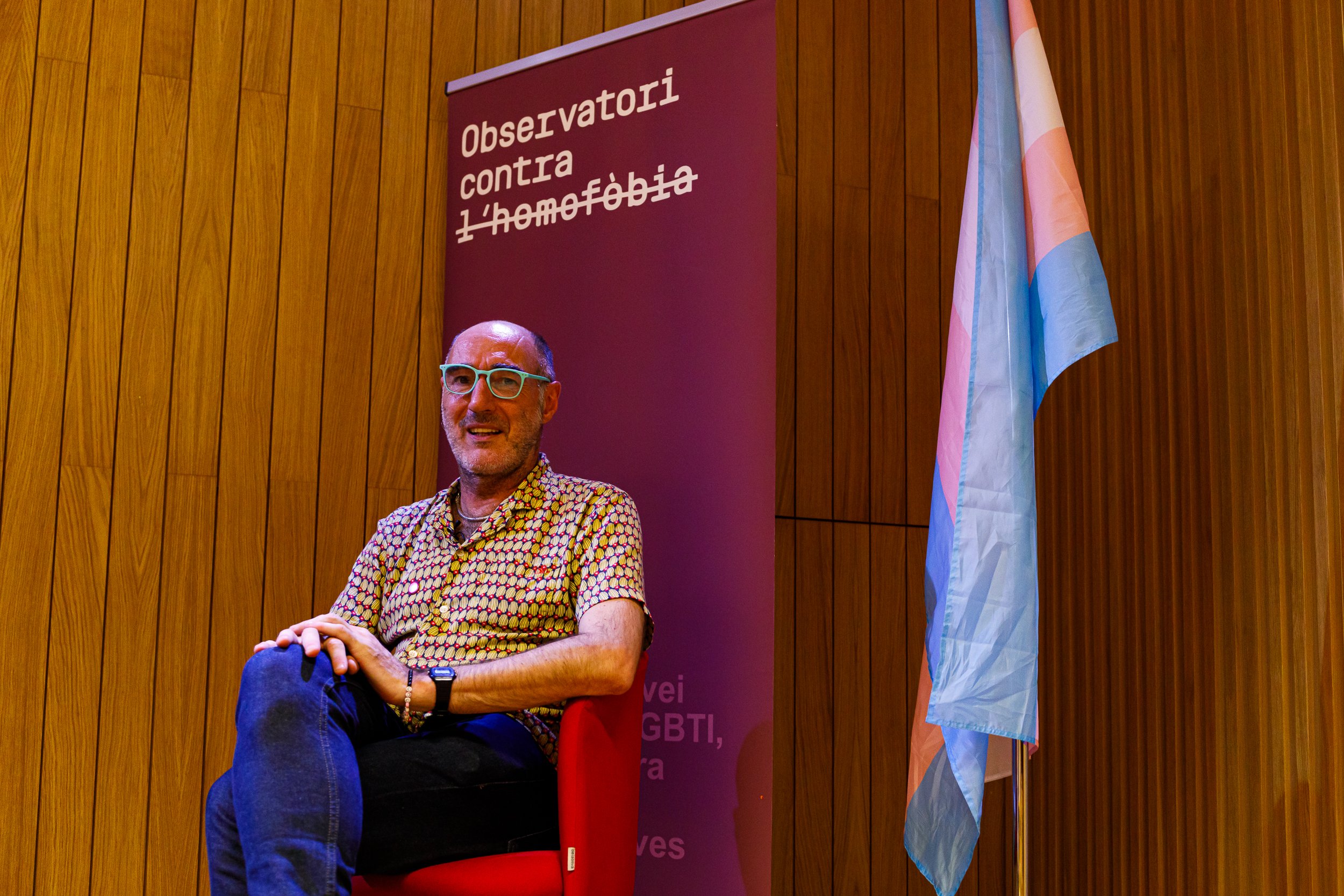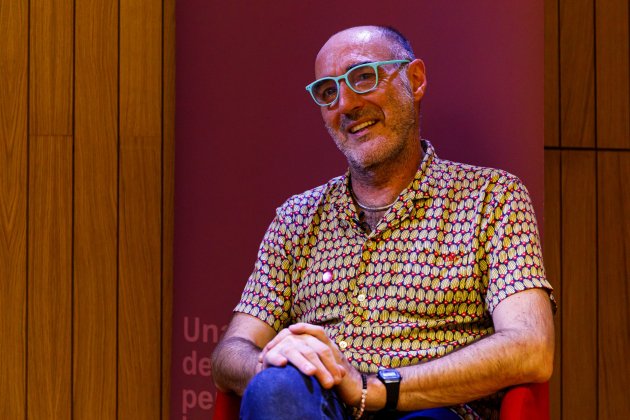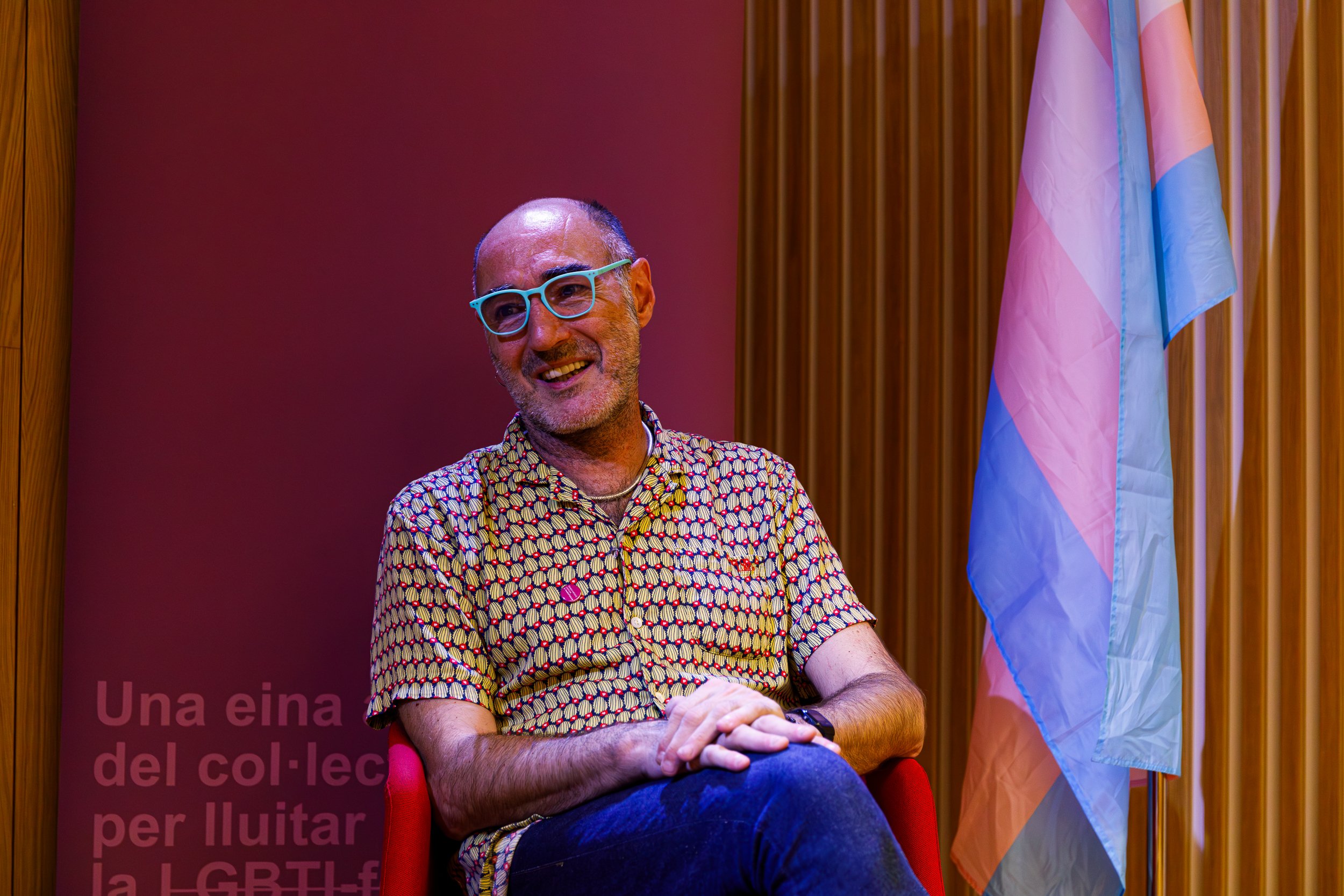Eugeni Rodríguez (1965) is the president of the Observatory Against Homophobia, an organization that will be 15 years old in 2023. For this Catalan body - a watchdog, complaints and care service against discrimination, homophobia, biphobia and transphobia - its anniversary comes in a context of contrasts. On the one hand, more laws have been passed in recent years in defence of the rights of the LGTBI group, but, on the other hand, the rise of the extreme right threatens the progress the community has made in recent decades. According to Rodríguez, the organization's data shows that this year there have been 150 reports of all kinds of LGBTI-phobic attacks. Compared to the total of 237 in 2022, an increase is already visible. Whatever the direct cause of that rise, the fact is that far-right Vox, campaigning for the July 23rd election, is endeavouring to question the rights of LGBTI people, and to bring the collective's rights and freedoms into public debate. Precisely in this context, the Observatory Against Homophobia chose to mark this year's Pride Day, the International Day of LGBTI+ Liberation, under a very clear slogan: "Let's confront the hatred, and stop fascism and LGTBI-phobia".
You have called 2021 the year of LGBTI-phobia and 2022 the year of transphobia. Looking ahead to 2023, how is this year shaping up for the collective?
2021 was a paradigmatic year because there was the murder of Samuel Luiz. For hours after it happened there was talk of "death", when he had not died a natural death: it was murder. For a lot of people, that tipped the balance. Enough of naturalizing and internalizing the fucking faggot, disgusting tranny or dyke abuse. There were a lot of complaints, it was a small revolt around Samuel's case. That's why it was the year of LGTBI-phobia. In 2022, the trans and LGTBI law arrived and created a terrible polarization. There was talk of "the erasure of women" and horrific things were said. For example, the issue of trans women in women's prisons began to be questioned, when since 2005 they have been living completely normally. It was an absolutely terrible year. We will soon give the data for 2022, but we can sum it up as the year of transphobia. You are asking me about 2023, but we are halfway through the year. I can say that if in 2022 there were 237 complaints, now we are already at 150. So this points to a very large increase. In addition, we have seen the tarpaulin of shame on a street in Madrid. It's happened historically, fascism has always thrown us into the bin. This hate speech that is the antechamber of hate crime. So, I'd say that right now this is the semester of hate speech.
In fact, now we are seeing how the far right is entering institutions and the red carpet is being rolled out for them. What do you think will be the impact of the institutionalization of this discourse through these municipal and regional governments?
It is terrible because fascism has always used the very democratic structures to destroy them. It sounds like an oxymoron, but it's true. I think you have to be very responsible. And now I do want to address young people especially: they must be very aware that this anti-system that is being presented to us by the extreme right is to confront democracy. Because being opposed to the democratic system is fascism, and fascism is authoritarianism, it is violence, it is darkness. We must be aware that there are paths that are very difficult to reverse. Therefore, we must be aware that the rights and freedoms of women and LGBTI people cannot be auctioned off, nor can they be in dispute. These "red carpets" must have a red line that cannot be crossed.
We will demand that the public authorities act absolutely forcefully, as [forceful as] they are. They have no problem turning back the constitutional order many times. The slogan for June 28th, for today, is: "Let's confront the hatred, and stop fascism and LGTBI-phobia". I think that now that the general election is coming, this is the message we want to give.
There are far-right movements all over Europe, within which we see differences. For example, there are movements that are very aggressive against the entire LGTBI group such as Vox or Orbán in Hungary, and there are others, such as Le Pen, that have a discourse of acceptance of some parts of the collective. Is there a part of the extreme right that tries to pinkwash to be less aggressive?
The extreme right has a worldwide trait, which is a hatred of outsiders. This is what unites them absolutely everywhere. Then there is LGTBI-phobia and questioning gender-based violence, because they look at each specific place to see what the situation is in that particular country. It's not that they aren't [against those things], but that they don't have the right characteristics to say so. But they are LGTBI-phobic, they are authoritarian, they want uniformity, so anything that strays from that uniformity, they will be against it.
Watch out, because we will end up with black and white movies, no sound, and they will put in their subtitles.
Earlier we were talking about the campaign that is already starting in the run-up to the snap general election, in which the rights of the LGBTI collective are being questioned time and time again. Do you think the far right may be hijacking the discourse of this 23rd July campaign?
They don't innovate. Fascism has historically used the same tools. They have always had support from the media. Except for public media, where there is some control, the privates are clearly in the hands of money. This should also make you think. It is true that they have created a discourse that in moments of precariousness, in moments of economic crisis, if you can believe that others or minorities are to blame, it makes you feel better. In short, the same as ever: the traditional and the mainstream. We have to ask ourselves: do we really want a NO-DO image, in black and white and cinema without even sound, just silent? Because that is the society we want to map out, in which they put in the subtitles of what you have to say. Watch out, because we will end up with black and white movies, no sound, and they will put in their subtitles.
Physical aggression is terrible, but there is silent violence such as harassment, bullying, isolation. All this generates a lot of pain and a lot of exclusion.
Do we have wrongly perceive what violence against LGBTI+ people is, I mean, are we stuck in identifying only physical violence?
We don't have a good understanding, because sometimes we think that violence must necessarily be physical. Within our collective we also reproduce this image, for example with photographs with bloodied faces on Instagram. Physical aggression is terrible, but there is silent violence such as harassment, bullying, isolation. All this generates a lot of pain and a lot of exclusion. For example, the fact that trans women cannot access the employment market. This is serious violence because if you can't work, you can't become independent, you can't have a decent life.
In the past, you've pointed out that hatred directed against the collective on the internet is skyrocketing. Is there a normalization of these types of violence in digital media?
On that, there is almost an exclusive. Very soon, we have requested, with the Trans Platform at Spanish level, a meeting with the new prosecutor for hate crimes, who is Miguel Ángel Aguilar, who comes from Barcelona. It is a subject that concerns us and keeps us busy a lot. There were more than 125,000 messages on social media (mainly Twitter) against trans people. It is a sewer of absolutely enormous dimensions and with total impunity, so we demand that the public prosecutors give very clear indicators for Twitter, for Instagram, for Facebook and that they must be complied with.

A few months ago, the new trans and LGTBI law was passed. How do you rate the process and the first months of its application?
The law is now beginning to walk, but in the middle of this walk, next month, the Spanish Cortes, which has to implement it, were dissolved. We are at an impasse and the real fear is that the next government may repeal this law, if that happens, they will have to face us down. However, it has cost a lot. I think it is a very powerful tool, but, on the other hand, also in Catalonia, in our space, our country, we have our own tools. We have the 2014 law guranteeing LGBTI+ rights, which will now be amended at the end of July and which will also be a very powerful tool.
Looking at the evolution of the election campaign, could we expect the days of the law to be numbered?
I hope that the right does not win, nor the extreme right, and that it is not repealed. But if it happens, they'll have us in front of them fighting for it to be brought back. In addition, it is a law that has been applauded worldwide by human rights organizations and international LGBTI rights organizations. But we have to see what happens.
Why is the transsexual woman not wanted? Because in a way she calls into question the patriarchal model, the same model as ever. It's a paradigm shift that they didn't want to accept, when really it's a contribution to giving plurality within the concept of woman
Hate speech against the trans community mostly focuses on trans women, leaving transmasculinity relatively sidelined. Are trans women so much in the spotlight because the intersection of patriarchy and LGBTI-phobia means that women's bodies are constantly policed?
With the trans law, a phenomenon has happened that has shocked, paralysed, distorted and affected us greatly. A sector with which we were shoulder to shoulder for many years, which was part of feminism, has become TERF (acronym for 'trans-exclusionary radical feminist'), has gone all the way in a fight that has done the dirty work for the extreme right. The Partido Feminista, some parts of the PSOE and some sectors in Catalonia have entered this game. It involves not wanting to lose a hegemonic sense of what feminist policies were, there was a concept of woman. That is what has united the two extremes: the idea of being uniform and that there can be no variation. Why is the transsexual woman not wanted? Because in a way she calls into question the patriarchal model, as you were saying, the same model as ever. It's a paradigm shift that they didn't want to accept, when really it's a contribution to giving plurality within the concept of woman that I think favoured them.
How is it that trans men are not subjected to the same degree of scrutiny and questioning in the political debate? For trans women, the very concept of what it is to be a woman is in question, but not for men. Does masculinity, as a universal subject, not question itself?
Really, the trans man is not questioned in principle because he is not considered a man, because he is already discredited, because in the end it is a genital issue. In the case of women, what upsets is that a woman can have genitals that they consider masculine. But in reality we don't have genitals that make a body, but a body in which there are genitals.

This year the Observatory Against Homophobia is 15 years old. Although the present moment is difficult, looking back, is the balance of these years positive?
I'm really happy, truly. We have a very compact, professional team, with very good and young activists. We have been able to go beyond Barcelona and be present in part of the territory. But the most important thing is that we have become an indisputable benchmark. In the area of Catalonia, at Spanish state level and, even I would say, on an international scale.
And for the future?
I think that in Barcelona and Catalonia, within the Spanish state, we are safe enough, in the sense that we are not afraid that there will be a danger that prevents us from continuing with our work. But I do worry that it is not a priority, because it is not in Catalonia nor in Barcelona city council when it comes to providing financial support and human resources for this immense task. Cristian Garriga, our psychologist and technical coordinator, says it: "Behind every piece of data there is a person."

